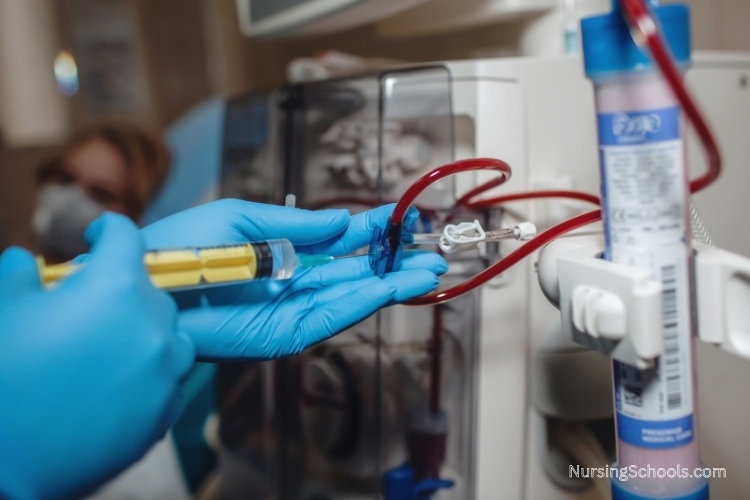Renal Dialysis Nurse
Nursing Career Guide

For patients with kidney failure, dialysis is a life-sustaining treatment, and Renal Dialysis Nurses are essential to making that treatment safe and effective. These nurses manage hemodialysis and peritoneal dialysis procedures, monitor patient responses, and educate individuals on managing chronic kidney disease. They often work in outpatient dialysis centers and hospitals or even provide in-home care, forming long-term relationships with patients who require ongoing support. Let's delve into the Renal Dialysis Nurse career and explore what it takes to thrive in this vital nursing specialty.
Overview
What Is a Renal Dialysis Nurse?
A Renal Dialysis Nurse, also known as a Nephrology Nurse, specializes in the care of patients with kidney disease who require dialysis treatment. These nurses work with patients suffering from acute or chronic kidney failure, assisting with hemodialysis, peritoneal dialysis, and other renal care procedures.
Renal Dialysis Nurses work in hospitals, dialysis centers, outpatient clinics, and home healthcare settings. They collaborate with nephrologists, dietitians, and social workers to manage dialysis treatment plans and educate patients on kidney disease management.
This career requires expertise in dialysis equipment, fluid and electrolyte balance, and patient education to ensure safe and effective renal care.
Education
How To Become a Renal Dialysis Nurse
Becoming a Renal Dialysis Nurse requires a combination of traditional nursing education, clinical experience, certification, and specialized training in nephrology nursing and dialysis procedures. Follow these steps to enter this challenging and rewarding healthcare career:
- Earn a Nursing Degree. Complete an Associate of Science in Nursing (ASN) or Bachelor of Science in Nursing (BSN). A BSN is preferred for advanced nephrology nursing roles.
- Pass the NCLEX-RN. Obtain your nursing license by passing the National Council Licensure Examination for Registered Nurses (NCLEX-RN).
- Gain Clinical Experience. Work as a Registered Nurse (RN) in nephrology units, dialysis centers, or intensive care units (ICUs) to develop expertise in renal care.
- Obtain Dialysis Nursing Certification. Earn the Certified Nephrology Nurse (CNN) or Certified Dialysis Nurse (CDN) credential through the Nephrology Nursing Certification Commission (NNCC) to demonstrate expertise in dialysis care.
- Continue Professional Development. Stay updated with advancements in kidney disease treatments, dialysis technology, and patient management through continuing education and professional workshops.
On average, it takes 4-6 years to become a Renal Dialysis Nurse, including nursing school, licensure, and obtaining specialized training. Certification enhances job opportunities and credibility in this field.

Average Salary
How Much Does a Renal Dialysis Nurse Make?
Salaries for Renal Dialysis Nurses vary based on experience, location, and work setting. On average, a Renal Dialysis Nurse can expect to earn between $75,000 and $110,000 annually.
Average annual salary for a Renal Dialysis Nurse:
- Entry-level: $75,000 - $85,000 per year.
- Mid-career: $85,000 - $95,000 per year.
- Experienced: $95,000 - $110,000 per year.
The U.S. Department of Labor reports that Renal Dialysis Nurses earn an average hourly wage of approximately $39.00 per hour. Assuming a 40-hour workweek, this equates to an annual salary of $81,120. The lowest 10% earn less than $34.00 per hour, while the highest 10% earn more than $48.00 per hour, resulting in an annual salary range of $70,720 to $99,840 per year.
Job Duties
What Does a Renal Dialysis Nurse Do?
Renal Dialysis Nurses provide specialized care for patients undergoing dialysis treatments. Their role includes patient assessment, dialysis administration, and ongoing kidney disease management.
The most common job duties of a Renal Dialysis Nurse:
- Preparing Patients for Dialysis. Assess patient vitals, review lab results, and prepare access sites for treatment.
- Administering Dialysis Treatments. Operate hemodialysis and peritoneal dialysis machines, ensuring safe and effective filtration of toxins from the blood.
- Monitoring Patients During Dialysis. Observe for complications such as hypotension, clotting, or fluid imbalances.
- Educating Patients on Kidney Disease. Provide guidance on dietary restrictions, medication management, and lifestyle modifications to support kidney health.
- Managing Vascular Access Sites. Care for fistulas, grafts, and central venous catheters to prevent infections and complications.
- Responding to Emergencies. Identify and treat dialysis-related complications such as fluid overload, electrolyte imbalances, or cardiac arrhythmias.
- Collaborating with Healthcare Teams. Work with nephrologists, dietitians, and social workers to develop comprehensive treatment plans.
- Advanced Duties. Experienced Renal Dialysis Nurses may specialize in home dialysis training, pediatric nephrology, or kidney transplant coordination.
Renal Dialysis Nurses typically work in hospitals, dialysis centers, nephrology clinics, and home healthcare settings. Their role is essential in helping patients manage kidney disease and maintain their quality of life.

Essential Skills
What Skills Does a Renal Dialysis Nurse Need?
Renal Dialysis Nurses require a combination of technical expertise, patient education skills, and critical thinking abilities. These skills enable them to provide effective dialysis treatment and support long-term kidney disease management.
Here are some of the skills a Renal Dialysis Nurse needs to succeed:
- Dialysis Equipment Operation. Safely operate and troubleshoot hemodialysis and peritoneal dialysis machines.
- Patient Assessment. Monitor kidney function, fluid balance, and electrolyte levels before and after dialysis.
- Vascular Access Management. Care for fistulas, grafts, and central lines to prevent complications.
- Emergency Response. Recognize and manage dialysis-related complications such as hypotension, clotting, or cardiac instability.
- Patient Education. Teach patients about kidney disease management, dietary guidelines, and home dialysis options.
- Collaboration. Work with nephrologists, social workers, nurse health coaches, and dietitians to optimize patient care.
- Infection Control. Follow strict hygiene protocols to prevent bloodstream infections and complications.
- Empathy and Communication. Provide emotional support to patients coping with chronic kidney disease and dialysis treatments.
One of the biggest challenges of being a Renal Dialysis Nurse is helping patients manage the emotional and physical demands of long-term dialysis treatments. However, the role is highly rewarding, as it allows nurses to improve patients' quality of life and support them in managing their kidney health.
Last updated: August 30, 2025
References:
- Registered Nurses. Bureau of Labor Statistics, U.S. Department of Labor. Occupational Outlook Handbook. Retrieved August 30, 2025.
- NCLEX Nurse Licensure Exam. National Council of State Boards of Nursing (NCSBN). Retrieved August 30, 2025.
- Nephrology Nurse. Johnson & Johnson, Nursing Careers. Retrieved August 30, 2025.
- Renal-Dialysis Salary in the United States. ZipRecruiter, Healthcare Career Path. Retrieved August 30, 2025.
- Nursing Specialty Certifications. American Nurses Association (ANA). Retrieved August 30, 2025.
- What is Nephrology Nursing. American Nephrology Nurses Association (ANNA). Retrieved August 30, 2025.
- The Role of Nephrology Nurses in Symptom Management. Kidney Int Rep, PubMed Central (PMC). Retrieved August 30, 2025.
- Exploring the Role of Dialysis Nurses. Nightingale College, Healthcare Career Guide. Retrieved August 30, 2025.
- Demystifying Dialysis. University of Florida Health. Retrieved August 30, 2025.
- CNN and CDN Nurse Certification. Nephrology Nursing Certification Commission (NNCC). Retrieved August 30, 2025.
- Health professionals organization specializing in kidney disease. International Society of Nephrology (ISN). Retrieved August 30, 2025.


